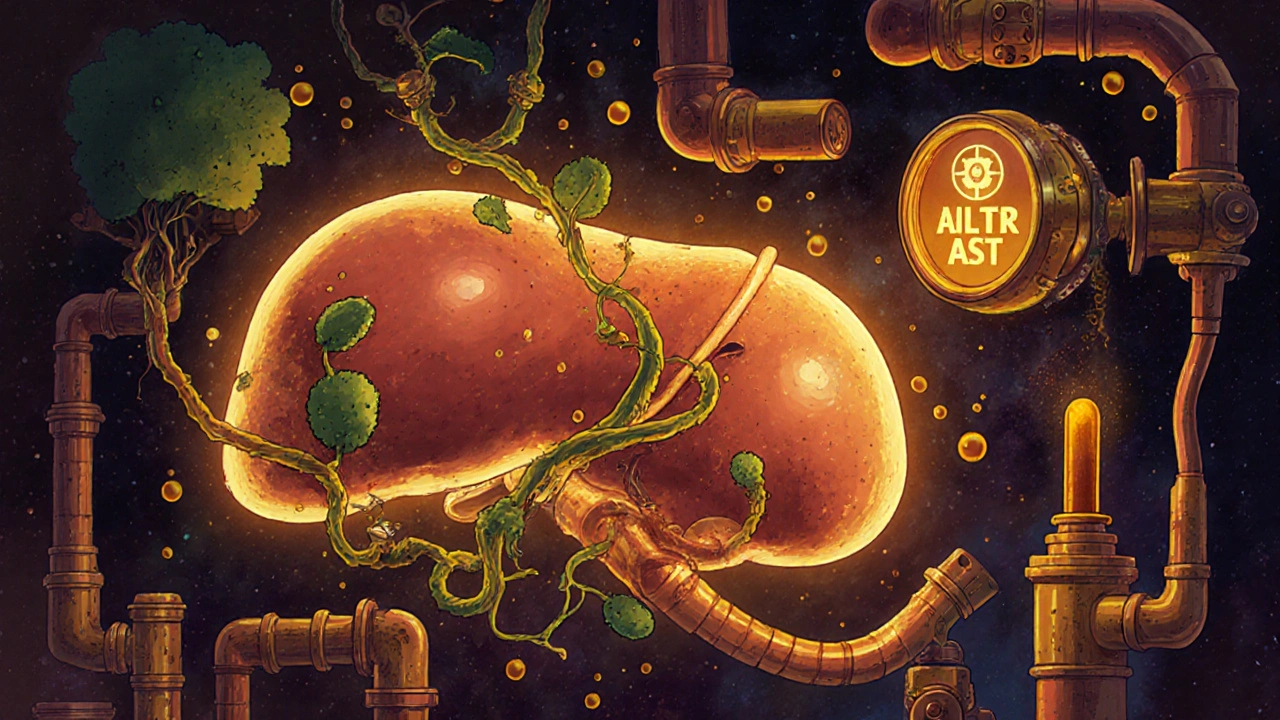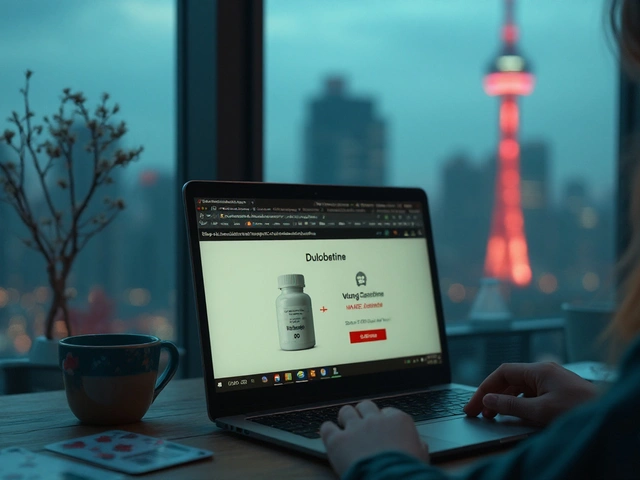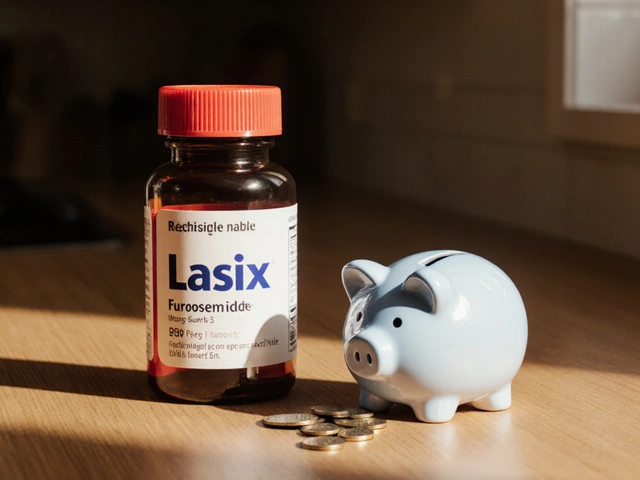
When your liver feels sluggish - after a night of heavy eating, too much alcohol, or just years of modern life - you might turn to Liv.52 Syrup. It’s been around since the 1950s, made from extracts of chicory and the caper bush, and is widely used across South Asia and beyond. But is it still the best choice? With so many herbal liver support options now available, it’s worth asking: what else works, and how do they stack up?
What’s in Liv.52 Syrup, really?
Liv.52 Syrup isn’t just one herb. It’s a blend, but the two core ingredients you’ll find in every bottle are Chicory (Cichorium intybus) and Caper Bush (Capparis spinosa). These aren’t random picks. Chicory root has been used for centuries in Ayurveda and traditional Mediterranean medicine to stimulate bile flow and reduce liver inflammation. The caper bush, especially its buds and leaves, contains flavonoids and alkaloids that help protect liver cells from toxins.
Studies from the Indian Journal of Medical Research in 2018 showed that Liv.52 significantly lowered elevated liver enzymes - ALT and AST - in people with mild fatty liver. That’s a measurable sign the liver is healing. But here’s the catch: most of the research was done in India, often with small groups. There’s limited independent data from Western clinical trials.
Why look for alternatives?
People turn to alternatives for several reasons. Maybe Liv.52 isn’t available where they live. Maybe they want something with stronger clinical backing. Or perhaps they’re sensitive to sugar - Liv.52 Syrup contains added sucrose, which isn’t ideal for diabetics or those avoiding refined sugars. Others want a formula that includes more modern herbal science, like milk thistle or NAC.
Here’s what’s out there - and how they compare.
Milk Thistle (Silymarin): The Western Gold Standard
If you’ve ever walked into a health store and seen a bottle labeled "liver support," chances are it had milk thistle. The active compound, silymarin, is one of the most researched herbal liver protectants on the planet. Over 300 studies have looked at its effects.
Unlike Liv.52, which works as a broad tonic, milk thistle is a targeted antioxidant. It blocks toxins from entering liver cells, boosts glutathione (your body’s master detox antioxidant), and even helps regenerate damaged liver tissue. A 2021 meta-analysis in the Journal of Clinical and Translational Hepatology found silymarin improved liver function in 78% of patients with non-alcoholic fatty liver disease (NAFLD).
Compared to Liv.52, milk thistle has more consistent global data. But it doesn’t stimulate bile flow as strongly. So if your issue is sluggish digestion or constipation along with liver fatigue, Liv.52 might give you more immediate relief.
Artichoke Leaf Extract: Bile Flow Specialist
Artichoke leaf extract is the closest thing to chicory in terms of action. It’s been used in Europe for over 200 years to treat digestive complaints tied to liver congestion. Like chicory, it increases bile production, which helps break down fats and flush out toxins.
A 2020 randomized trial in Germany showed artichoke extract improved bloating and right-side discomfort in 82% of participants with functional dyspepsia - symptoms often linked to poor liver drainage. It’s also lower in sugar than Liv.52 Syrup, making it a better fit for people watching their glucose levels.
Where it falls short: it doesn’t have the same cell-protective power as caper bush or milk thistle. It’s great for clearing out gunk, but not for repairing damage.

Dandelion Root: The Gentle Cleanser
Dandelion root is the quiet workhorse of herbal liver support. It’s mild, affordable, and widely available. In traditional medicine, it’s used to "cleanse" the liver and support kidney function at the same time.
Research shows dandelion root has antioxidant properties and can reduce liver fat buildup in animal models. But human studies are limited. One small 2022 pilot study in Australia found participants taking dandelion root extract for 8 weeks saw a 15% drop in liver fat on ultrasound - not as strong as milk thistle, but noticeable.
It’s a good option if you want something gentle, especially if you’re new to herbal supplements. But if you’re dealing with elevated liver enzymes or diagnosed fatty liver, you’ll likely need something stronger.
N-Acetyl Cysteine (NAC): The Biochemical Heavyweight
NAC isn’t an herb. It’s a synthetic form of the amino acid cysteine, and it’s the building block for glutathione - your liver’s most important detox molecule. It’s used in hospitals to treat acetaminophen overdose because it literally saves lives.
In chronic liver conditions, NAC helps reduce oxidative stress and inflammation. A 2023 trial in the European Journal of Gastroenterology showed NAC, when combined with lifestyle changes, improved liver enzyme levels in NAFLD patients more than placebo.
It’s powerful - but not a tonic. You won’t feel "cleansed" or see better digestion. It works silently at the cellular level. Best used alongside other herbs or as part of a medical protocol, not as a standalone daily supplement.
Comparing the Options
Here’s how these four alternatives stack up against Liv.52 Syrup:
| Supplement | Key Action | Best For | Sugar Content | Clinical Evidence |
|---|---|---|---|---|
| Liv.52 Syrup | Bile stimulation, cell protection | General liver fatigue, sluggish digestion | High (sucrose) | Moderate (mostly Indian studies) |
| Milk Thistle (Silymarin) | Antioxidant, cell regeneration | Fatty liver, toxin exposure | Low (capsules/tablets) | Strong (global, peer-reviewed) |
| Artichoke Leaf Extract | Bile flow enhancement | Bloating, post-meal discomfort | Low | Moderate (European trials) |
| Dandelion Root | Gentle detox, mild diuretic | Beginners, maintenance | Low | Weak (mostly animal studies) |
| NAC | Boosts glutathione, reduces oxidative stress | Severe liver stress, medical support | None | Very Strong (clinical use proven) |

Who should stick with Liv.52 Syrup?
If you’ve been using Liv.52 for years and feel better - don’t rush to switch. It works for many. It’s especially helpful if you experience:
- Right-side abdominal discomfort after fatty meals
- Feeling bloated or heavy after eating
- Dark urine or pale stools (signs of poor bile flow)
- General fatigue tied to poor digestion
It’s also a good choice if you prefer traditional herbal formulas over isolated compounds. The synergy between chicory and caper bush may be more than the sum of its parts.
When to switch to something else
Consider switching if:
- You have diabetes or are watching your sugar intake
- You have a confirmed diagnosis of NAFLD or elevated liver enzymes
- You’ve tried Liv.52 for 8-12 weeks and seen no change
- You want stronger scientific backing for your supplement
- You’re on medications - milk thistle and NAC have more documented safety profiles with drugs
For those with fatty liver, the best approach often combines milk thistle with lifestyle changes: reducing alcohol, cutting sugar, and moving more. NAC can be added if enzymes stay high. Artichoke leaf helps if bloating persists.
What’s missing from the market?
There’s a gap: no widely available supplement combines the bile-stimulating power of chicory and caper bush with the proven antioxidant strength of milk thistle and NAC. Most brands pick one path - traditional or modern - but not both.
If you’re tech-savvy, some compounding pharmacies in Australia and the U.S. can make custom blends. But they’re expensive and not regulated like commercial products.
Final advice: Start simple, track results
Don’t stack five liver supplements at once. Pick one. Give it 6-8 weeks. Keep a simple journal: note energy levels, digestion, sleep, and any discomfort. Then retest your liver enzymes if you can - even a basic blood test from your doctor tells you if it’s working.
Liv.52 Syrup has a long history. But science doesn’t sleep. The best liver support isn’t about sticking to tradition - it’s about matching the tool to the problem. Your liver doesn’t care what century the herb comes from. It just wants to work.
Is Liv.52 Syrup safe for long-term use?
Yes, for most people. Liv.52 has been used safely for decades in traditional practice. But because it contains sugar, long-term use isn’t ideal for diabetics or those with insulin resistance. If you’re using it for more than 3 months, check in with a healthcare provider - especially if you’re on other medications.
Can I take Liv.52 Syrup with alcohol?
No. Liv.52 is meant to help your liver recover from alcohol damage, not protect it while you keep drinking. Alcohol and Liv.52 together don’t cancel each other out - alcohol still harms liver cells. Use Liv.52 as part of a recovery plan, not a license to drink.
Does milk thistle work better than Liv.52 for fatty liver?
For fatty liver disease, milk thistle has stronger clinical evidence. Multiple studies show it reduces liver fat and inflammation more reliably than Liv.52. Liv.52 helps with symptoms like bloating, but milk thistle targets the root cause - oxidative stress and fat buildup. Many practitioners recommend milk thistle as first-line for NAFLD.
Are there any side effects from Liv.52 Syrup?
Side effects are rare but possible. Some people report mild stomach upset, diarrhea, or allergic reactions - especially if sensitive to plants in the Asteraceae family (like dandelion or chicory). The high sugar content can also cause blood sugar spikes. Always check the label for ingredients if you have allergies.
Where can I buy reliable alternatives to Liv.52 Syrup?
Look for brands that use standardized extracts: milk thistle with at least 70% silymarin, artichoke leaf extract with 5% cynarin. In Australia, brands like Metagenics, Integrative Medicine, and Nutra-Life offer high-quality versions. Avoid cheap, unbranded supplements - they often contain fillers or too little active ingredient to matter.
Emily Kidd
liv.52 is kinda gross tbh the syrup is like drinking sugary herbal medicine from 1998. i switched to milk thistle caps and my digestion went from 'why am i bloated after toast' to 'wait i can actually eat tacos again'. no more sugar crash after taking it either.
Justin Cheah
you guys are missing the real story here. the indian studies on liv.52 were funded by pharma subsidiaries that also own patent rights to caper bush extraction tech. the west suppresses this because milk thistle is cheaper to mass produce and the fda doesn't regulate herbs like they do drugs. if you're actually sick and not just 'feeling sluggish' you're being manipulated into buying placebo formulas while real solutions get buried. nac is the only thing that actually works and it's available over the counter because no one can patent an amino acid. they want you dependent on syrup.
caiden gilbert
the way this post laid out the comparison was like watching a chef explain why a rustic stew beats a molecular gastronomy dish. liv.52 is the warm hug your liver remembers from childhood. milk thistle is the personal trainer that shows up at 5am with a clipboard. neither is wrong, but one makes you feel like you're being held while the other makes you want to run a marathon. artichoke leaf? that’s the quiet cousin who always brings the good olive oil to family dinners.
phenter mine
im a big fan of dandelion root tea, its so cheap and i just brew it like regular tea. i dont know if its actually working but i feel less bloated after meals and my pee is clearer. i think its the placebo but also maybe not? i keep taking it because its easy and doesnt cost a fortune. def go with the capsules if you hate the taste though.
Aditya Singh
the entire premise is flawed. you're comparing a polyherbal formulation with single-molecule interventions. this is like comparing ayurvedic panchakarma with a statin. the synergy of chicory and caper bush modulates multiple hepatic pathways simultaneously-phase i/ii detox enzymes, bile acid transporters, and antioxidant cascades-whereas silymarin is merely a free radical scavenger with limited bioavailability. the meta-analyses you cite are statistically underpowered and culturally biased. unless you're referencing the 2019 multicenter trial from AIIMS Delhi, you're not engaging with the real evidence base.
Katherine Reinarz
ok but like… what if you just… stop drinking so much? like why are we all so obsessed with finding magic potions to undo our bad choices? i tried liv.52 for a week and felt like a robot on a sugar high then i just started drinking water and going to bed before 1am and my liver stopped screaming. maybe the real supplement is sleep?
John Kane
hey everyone-just wanted to say this is one of the most balanced, thoughtful breakdowns i’ve seen on herbal liver support. seriously, kudos to the author. i’ve been using milk thistle for my fatty liver diagnosis, but after reading this, i’m going to add artichoke leaf extract in the mornings and keep the dandelion tea at night. it’s not about picking one winner-it’s about layering tools that match your body’s needs. also, if you’re in the us and struggling to find quality brands, check out the supplement reviews on r/Supplements. the community there vets everything. your liver will thank you.
Callum Breden
This article is a textbook example of pseudoscientific fluff dressed in academic formatting. The term 'liver support' is not a medical classification. There is no such thing as a 'sluggish liver.' The liver does not 'feel' anything. Elevated transaminases are biomarkers of hepatocellular injury-not 'fatigue.' To recommend herbal syrups containing sucrose as a primary intervention for NAFLD is not merely irresponsible-it is dangerous. The only evidence-based adjuncts are weight loss, abstinence from alcohol, and NAC in select cases. Everything else is marketing.
Mansi Gupta
Thank you for sharing such a comprehensive overview. As someone who grew up with Liv.52 in India, I’ve seen generations use it without issue. But I also work in a clinic in Mumbai where patients come with advanced fatty liver and insist they’re 'fine' because they take Liv.52 daily. The sugar content is a silent problem. Perhaps the future lies in combining traditional wisdom with modern delivery systems-like a low-sugar, standardized extract blend. We need more research that bridges both worlds, not pits them against each other.
Erin Corcoran
just tried the artichoke leaf extract last week and OMG it’s a game changer for my post-dinner bloating 🤯 no more feeling like i swallowed a beach ball after pizza. also way cheaper than liv.52 and no sugar crash. still taking milk thistle at night for the antioxidant boost. combo = 🍕➡️😌





Write a comment